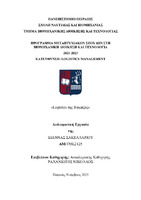Logistics της βιομάζας

View/
Keywords
Ολοκληρωμένα κέντρα βιομάζας ; Βιωσιμότητα κέντρων διαχείρισης βιομάζας ; Κυκλική οικονομία ; Βιομάζα ; Στρατηγική ; Λήψη αποφάσεων ; Κέντρο εφοδιαστικής βιομάζαςAbstract
This dissertation thesis explores recent developments in the field of biomass supply chain. The primary objective is the identification of emerging trends, challenges, and the regulations opportunities, laws governing these sectors and the proposition of strategies to strengthen its role in achieving sustainable development goals and creating integrated biomass centers.
Biomass, as a renewable and carbon-neutral energy source, has gained increasing attention in the pursuit of sustainable development. The thesis investigates the potential for converting biomass into bioenergy, biofuels and bioproducts, emphasizing the importance of efficient and environmentally friendly conversion technologies. These technologies include biochemical, thermochemical and hybrid methods, which allow for the extraction of valuable products from biomass, while simultaneously reducing greenhouse gas emissions. The thesis also identifies barriers to biomass use such as raw material availability, supply chain issues and regulatory constraints. To address these challenges, the thesis suggests the development of integrated biomass centers, enhanced research and development and supportive policies to promote the adoption of biomass and market development.
The thesis highlights proposals for developing integrated biomass centers through the analysis of the external environment using the strategic tool PESTEL, which, in addition to strategic development, extracts and manages data. Furthermore, an analysis of the internal environment followed, which provided information on the functions and systems of a biomass supply center. A MILP model that optimizes the decision-making process is presented.
The results of the thesis suggest that the successful management of integrated biomass centers is based. The optimal utilization of resources, on the in order minimize the downtime of the machinery in the industrial facility in combination with the development of a location model that minimizes the distance the unnecessary handling and material loss. In conclusion, this thesis provides a comprehensive analysis of the developments in the field biomass logistics, emphasizing their potential to lead to sustainable development in the management of logistic biomass.

